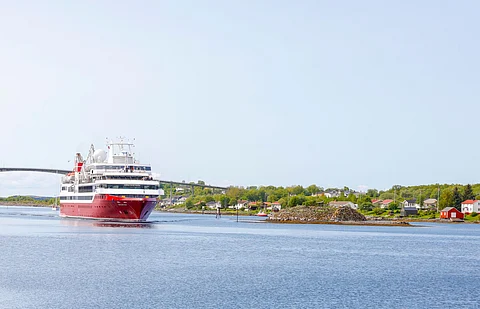

Passenger vessel EXPLORIS ONE sailing under the flag of the Bahamas, berthed at the port of Brønnøysund, Brønnøy municipality in Nordland County, Norway.
Photo: Adobe Stock.
Norway's Ministry of Fisheries and Oceans announced that the King in Council has adopted new legislative amendments ensuring that workers on ships in Norwegian waters and the Norwegian continental shelf are entitled to Norwegian wage conditions.
"This is an important day for Norway's maritime sector and our labor market," said the Norwegian Minister of Fisheries and Oceans, Marianne Sivertsen Næss. "With this, we ensure that offshore work will take place on Norwegian terms, with fair wages and equal competitive conditions," she added.
The Minister had introduced the bill to ensure that all workers at sea have good pay conditions, just one month after being appointed following a government reshuffle. "Since the government took office, we have been working on implementing a law to prevent social dumping in Norwegian waters and ensure that Norwegian shipowners using Norwegian seafarers are not undercut domestically," she explained then.
The background for the decision, the Ministry explained now, is the current situation, where foreign-registered ships – and to some extent, ships in the Norwegian International Ship Register (NIS) – operate in Norwegian waters with significantly lower wage levels than what is typical in Norway.
Until now, Norway had imposed few wage requirements on board foreign vessels in Norwegian waters and the Norwegian continental shelf. Employees were mainly subject to flag state regulations, which resulted in different wages even when performing the same work. "This has led to unfair competition," the Ministry now stated.
Therefore, as noted by the Minister, this was one of the first bills initiated by the current Norwegian government. It was initially intended to extend the scope of application of the Act on the General Application of Wage Conditions to domestic shipping, mainly coastal shipping, and to cruises primarily between Norwegian ports.
However, finally, the bill moved away from a separate law on ship labor conditions and joined it to the other sectors operating in Norwegian waters and the Norwegian continental shelf: petroleum, offshore wind energy, seabed mining, aquaculture, and carbon capture and storage.
Stressing that the changes, which, among others, will affect the General Implementation Act and the Petroleum Act, are an important step to strengthen equity in the maritime labor market, the Ministry of Fisheries and Oceans explained the implications of their implementation.
Regarding domestic shipping, the General Application Act will apply to cargo ships and cruise ships operating between Norwegian ports, which, the Ministry said, means that unions can demand that collective agreements apply across the board to all crew, regardless of their nationality.
As far as offshore services are concerned, a requirement for Norwegian wage conditions will be introduced for vessels providing services to offshore industries, including, as mentioned, offshore aquaculture. In this case, the responsibility for ensuring compliance with the wage conditions will lie with the license holders.
Amendments to the General Implementation Act will enter into force next week, on July 1. Amendments to the Petroleum Act and other sectoral laws will enter into force on January 1, 2026.
The Ministry also explained that the decision does not alter the flag state principle. The flag state still regulates the ship's safety and manning, and the measure is considered legal and proportionate under the European Economic Area Agreement.
"Norwegian maritime competence and experience are world-class. With this, we are also making the sea a more attractive career path for young people. We are to be a seafaring nation – but also a coastal and ocean nation that stands up for fairness and Norwegian values," Sivertsen Næss stated.
"We have seen a wage gap develop between work at sea and on land. Now we are closing that gap. Norwegian business operations should take place on Norwegian terms – also at sea," Norwegian Minister of Fisheries and Oceans concluded.
The approval of these legislative amendments follows the recent success of the Norwegian government, whose proposal for a new aquaculture regulation achieved a broad consensus in the Norwegian Parliament in the middle of this month. Just a few days later, the Ministry of Trade, Industry and Fisheries also opposed for consultation its proposal on the future of offshore aquaculture in Norway.
